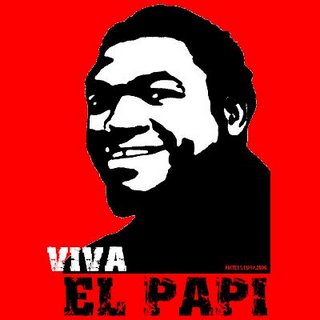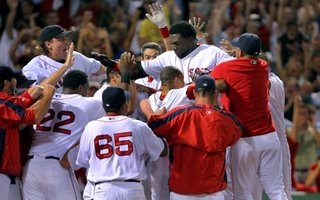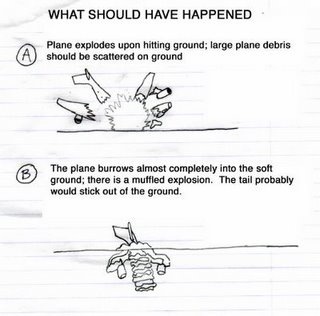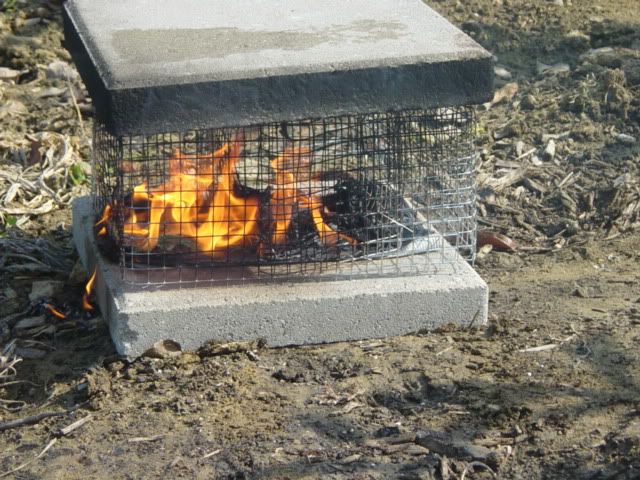This

equals this.

Now, go be an anti-Fascist and buy some of these guys stuff. Because Che Guevera was a murdering punk-ass bastard, but David Ortiz is is like chocolate syrup on an ice cream sundae.
VIVA EL PAPI!!!!
“The universal aptitude for ineptitude makes any human accomplishment an incredible miracle.” ―John Stapp


Top Hizbullah official: Group Didn't Expect Israel To React So Strongly
A senior Hizbullah official has said the group did not expect Israel to react so strongly to the capture of two Israeli soldiers. (AP)
Argument: The average English word has 2.5 syllables. It is a constant that a haiku stanza has 17 syllables. This means that the average haiku written in English will have in the environ of seven words. I have no idea how many syllables the average Japanese word contains, however, I do know that variety exists between the languages.
Hopefully, My Last Analysis of the Flight 93 Crash: Where I Show the Official Story Is Simply Wrong Here is the official government version of the flight 93 crash (all of the details can be found in the book "Among the Heroes" by Jere Longman):


This is why I mention the "Two On Two" program airing tonight. It's always good to interview men such as Magic and Bird and Carmelo Anthony and LeBron James, to see how they tick -- and from the league perspective, to see if such bounty as the Era of Bird and Magic spawned can ever be reproduced. David Stern would love it. Consciously or not, so would you. I myself once said on the L.A.-based show "Rome Is Burning" that everybody would probably get into it more if Carmelo Anthony, the foil for LeBron James, were a white kid instead of a black one. I didn't say it as an I-wish thing, or as a condemnation.
It is the first way people draw a rooting interest in our nation of fools.
But it is not the only way, as the Lakers joining the Pantheon of the Yankees, Notre Dame and the Dallas Cowboys as America's Teams shows.
Now we have Iceberg Jim asking Larry Bird, "Does the NBA lack enough white superstars, in your opinion?"
This, right after Bird is being one of the fellows, in his opinion, by saying he hated it when a white guy tried to guard him because he felt that was beneath him. There was laughter in this part of the segment, although it was nervous uncomfortable laughter from LeBron and 'Melo. Magic was laughing, but then he laughs at everything.
You know what's troubling about this? You and me. That's what the marketers think of us. Dangle the red meat of race in front of them, and they'll tune in and get the fruits and vegetables and all the stuff that's good for them but that they won't tune in for otherwise. That's No. 1.
No. 2, the timing. I mean, Gray asked this question, and elicits this answer, and there Luke Walton is! I mean, there he is, right in front of your eyes, as the only possible salvation of the Lakers in the NBA Finals! And you can't make a Luke Walton overnight. You can't I-wish up on one. It takes years and years and years of training, as well as many other variables falling exactly into place. It's just like when some of these know-nothings with ulterior motives ask, "Where are the American-born blacks in big league baseball?" And then I turn on the TV and there they are!
Somebody explain this to me.
It seems the only one who cares that Larry is white, is Larry.
No. 3, and somehow most disquieting: A couple of days before, in the run-up to Game 2 in L.A., Iceberg Jim Gray, who is a colleague of mine, a long-time acquaintance, was asking Shaquille O'Neal questions about the Finals and the Laker season, questions that don't get nearly as much media mileage as "Does the NBA lack enough white superstars, in your opinion?" Near the conclusion of Gray's interview with O'Neal, Gray asked O'Neal to characterize the Laker season; and O'Neal did, with the last word he used being "enigmatic."
Good word. O'Neal seemed to try to humorize his use of it by smiling and saying Jim might not feel the use of such a word was appropriate -- if, in fact, he knew what it meant. O'Neal was sort of diffusing his own use of the word, as if Jim would take it as inappropriate, not as a word -- it was exactly the proper word -- but inappropriate for Shaq to use.
The word seemed to throw Jim Gray, who said to Shaq, "Spell that."
I was stunned. Almost as stunned as when O'Neal almost defiantly spelled it perfectly. He's lucky Shaq responded. Responded? He's lucky Shaq didn't drill him. Luckily for Iceberg Jim, Shaq's not that type. Spell that? What is that supposed to prove?
Wait. Don't answer that. Somehow I think it's going to lead to a question about race. Iceberg Jim is not so innocent here; but then again, few of us are. I do wish we'd stop infecting others, though. The moral here, if we can find one under the pile of horsecrap: Don't ask people if they think there should be more white superstar ballers (when they are right under your nose) without asking if there should be more black superstar lawyers, doctors, and sports interviewers who can spell "enigmatic."
Good freaking word, Shaq. Thank you.

Of course, the risks we private pilots face pales in comparison to our military fliers, and is absolutely nothing compared to that met eye-to-eye by men and women like Rick Husband, Willie McCool, Dave Brown, Laurel Clark, Kalpana Chawla, Mike Anderson, and Ilan Ramon; nor does it require the courage and skill of Dick Scobee, Mike Smith, Ron McNair, El Onizuka, Christa McAuliffe, Greg Jarvis or Judy Resnik. These are the last crews of Columbia, and Challenger before her, buried with their ships in the skies over Florida and Texas. But many, many others have taken that walk in those spacesuits, smiling and waving as they pass the cameras on their way to their seats atop 2 million pounds of explosives, and they took exactly the same risks and bore them with the same courage. It is fitting that we remember the names of those lost with their ships, but not fitting at all that most of us cannot name a single living crewmember, some of whom have taken that walk four or five times.
Story Musgrave was one of those people. He described the Space Shuttle as "a beautiful butterfly that's bolted to a bullet."
Here’s what he meant:
Your chairs are facing the sky as you crawl into the Orbiter. You can barely move anyway in your orange pressure suits – thank god for the technicians. They literally ratchet the five-point harness across your chest and legs. On a full flight, it’s four on the flight deck: Pilot and Mission Commander on the controls up front. Two behind him, three on the deck below.
You sit for hours like this – minimum of three hours or so, often longer. There is a lot to think about, and I have no doubt that since Challenger rose and then fell on that cold January morning not one of them has been able to avoid seeing in their mind’s eye that horrible forked smoke trail and raining, smoldering debris. No one talks about this. No one has to. There’s a lot of smiling and nodding, but the chatter is kept to a minimum since the intercom is dominated by call-outs from launch control to the crew, most often the Mission Commander and Pilot.
There’s a lot of built-in holds, chances to catch up and work minor, last minute problems. At the T-21 minute hold, the Flight Director polls the Launch Control Team to confirm we are go for launch. This is a solemn moment. It is, in essence, the passing of a cup of responsibility. Everybody takes a sip. It’s a little less dramatic than in the Apollo days (Telemetry? GO! Cap COM? GO! Booster? GO FLIGHT!), but it’s still where we sign the check.
They pick up the countdown. There’s another built-in hold at T-9 minutes. Any one of these can, and very often does, result in catching one or more of the one million components falling out of nominal status. That’s either more delay strapped into your chair, or a trip home for the night, or the week, or the month.
T minus 31 seconds -- OBS takes over, with auto-sequence start at T-28. Software is running the countdown from this point forward, but anyone at any console can stop the launch if they are not happy.
Computers are checking each system twenty-five times a second. The crew hears everything. Pilot and Mission Commander are busy as hell, but the other five are essentially passengers, and now they are scared. Now they are calling on all of their courage, reasoning with themselves. Smiling at each other. That helps a lot. That and The Nod. The Nod is untranslatable. It means, very roughly, that I know what you went through to sit here with me, and you know the same about me. It’s not something you and I can do. This is something reserved for the very best people we have as a species. That inner voice, the one we cultivate and nurture through untold hours of training and simulation, whispers to us, pushing out the fear: Those controllers are the best there are. The engineers too. The technicians. All of them. We don’t know if they can keep us safe but we know they’ve done their best, and that’s as good as it gets.
Ten, nine, eight…
Okay, head back. Here we go. On the flight deck, some orange gantry out the left window – everything else is blue sky. A butterfly bolted to a bullet.
At T-6 seconds, fire-hoses of fuel and liquid oxygen begin to flow to the three main engines at the back of the Shuttle. They only give us about a quarter of the thrust we’ll need to get off the pad. But they’re on fire now, pushing the Orbiter forward, giving the crew the sickening feeling that the ship is falling over. The vanes constrict and focus the thrust – we’re going to need it all now. Everything she’s got.
Come on, baby. Come on.
The entire shuttle assembly rocks back into place now, and even during these last five seconds, computers can catch a stray reading and shut it all down…
Three, two, one…
SRB ignition. The two flanking Solid Rocket Boosters ignite, pitching more than a million pounds more thrust onto the orange External Tank, the bullet that the butterfly rides into orbit.
And now you’re headed for space, and there’s nothing you can do to stop it.
The SRB’s kick in, and that is what it is, a hammer to the back. You were scared before; you’re terrified now. The SRB’s are horrible, they’re pigs, they scrape and hiss and rattle and they feel like they will shake that ship to pieces. Look at the cockpit cameras during launch, and you’ll see the crew battered like they’re taking speed bumps at two hundred miles an hour. Everyone hates and fears the SRB’s; you’ll never relax while they’re burning.
15 seconds in and you’re clear of the tower. The Shuttle rolls 90 degrees left, fast. You’re not only on your back now, you’re tipping over upside-down and it’s getting worse as you angle out over the Atlantic.
A few miles away stand the smartest men and women the human race has ever produced, and they are watching over you like a hawk. There’s just so goddam little they can do for you now. They’ve already done everything they can and they’re as much a passenger as you are.
You are probably too scared to think about it, and it is CERTAINLY too loud to hear, but further away, thousands and thousands more watched the glare as the SRB’s lit. The Shuttle rolls off the pad in complete silence at that distance. It’s surreal. There’s nothing to compare it to. People are usually kind of quiet.
Then the sound hits you: you feel it in your chest more than hear it, the sound of millions of pieces of thick canvas being torn all at once. And then a funny thing happens, because you’re surrounded by people but suddenly you’re all alone out there – sunburn forgotten, mosquitoes a memory from a past life. You’re ten or fifteen or twenty miles away, but it’s just you and the white butterfly now, that’s all there is. You’re crying and you don’t know it, you're screaming but you can’t hear it, you’re jumping up and down, and it’s every time a Gator wide receiver ever beat a Florida State defensive end and he’s just pulling away and ain’t nothin’ gonna stop him now – he’s going all the way.
Go, baby! Go! GO! Go you son of a bitch! Yeah, they say she burns liquid hydrogen and LOX, but that’s just camouflage. It’s pure love that keeps that ship in the sky.
And she is going. She’s going like a bat out of hell. And every traffic jam and dental appointment and blind date and income tax form is suddenly worth it to be able to see this with your own eyes, to live through a time like this…It’s a pillar of fire and a pillar of smoke, but it’s not God coming down to speak to us, it’s us going up to have a word with Him. Good GOD look at her go!
40 seconds. The mains throttle back. Nothing stops the goddam solids: they keep roaring and hissing and knocking loose your fillings if you're dumb enough or human enough to keep your teeth clenched. We’re at Max Q, and the Shuttle is experiencing the highest aerodynamic loads it can bear. We keep getting faster, but the air starts to thin. This is as hard as the air can push back, and if we do it at full power we’ll be blown to pieces.
Fifty years ago it took all the Right Stuff we had in the box to push a tiny orange glider level through the sound barrier. Now we do it in less than a minute, straight up, from a standing start, with a spacecraft the size of a ten story building weighing a few million pounds. Ka-BOOOM! Mach 1, baby, and you ain’t seen nothin’ yet!
A little more than a minute and most of the atmosphere is behind us. Main engines back up to 104%
"Challenger GO at throttle-up…"
73 seconds.
“Oh no—“
That’s as far as Challenger got that cold January morning. 73 seconds. End of story.
“Roger Columbia, we copy you go at throttle-up”
I know how they must have felt at 2:02 – a kick and a pop, and all of a sudden, the ride turns to pure velvet as the SRB’s fall away. I know one of them must have looked at another and smiled. We’re safe now.
Well, safer. Now a complete engine failure could result in a return glide to Kennedy. Forget all that nonsense about parachutes and escape poles. At mach 5 and climbing the air is as hard as concrete.
2:32 – we’ve been in the air for two and a half minutes, and we are high and fast enough now to glide to Africa.
4:20 – Two engine Abort to Orbit – if we lose a main engine now, the other two will get us to orbit. We can sort things out up there.
7:00 – One engine ATO. Even better. We’re gonna make it.
7 minutes, 45 seconds. MECO. Main Engine Cut Off. Welcome to by-God outer space! Everything is strapped down except your arms. They float in front of you like they do at the top of a roller coaster. Only this one is going to last for two weeks. You’re weightless.